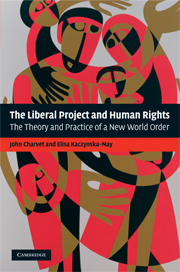Book contents
- Frontmatter
- Contents
- List of abbreviations
- Preface
- Introduction: what is liberalism?
- Part I Liberal beginnings
- Part II The UN regime on human rights
- Part III Critique and defence of liberalism
- 9 Western critiques of liberal human rights
- 10 Liberalism and non-Western cultures
- 11 In defence of liberalism
- Notes
- Index
10 - Liberalism and non-Western cultures
Published online by Cambridge University Press: 04 June 2010
- Frontmatter
- Contents
- List of abbreviations
- Preface
- Introduction: what is liberalism?
- Part I Liberal beginnings
- Part II The UN regime on human rights
- Part III Critique and defence of liberalism
- 9 Western critiques of liberal human rights
- 10 Liberalism and non-Western cultures
- 11 In defence of liberalism
- Notes
- Index
Summary
This chapter has a broader scope than that of a consideration of critiques of liberal human rights from non-Western cultural perspectives. It will cover some of these but it will also examine attempts to show that liberal practices can be endorsed from non-Western cultural perspectives. The latter literature claims either that there already exists an overlapping consensus of the major world cultures on human rights or that there would be no great difficulty in constructing one. An overlapping consensus in this context would be a consensus on the desirability of the actual practices prescribed by the United Nations human rights regimes but one that was supported in diverse ways by the different religious or metaphysical theories of the world's cultures.
We believe that such a consensus is both possible and highly desirable. A consensus on human rights of this kind has come about in the West, although some parties to the consensus, such as the Catholic Church, have joined it only recently. However, we believe also that some of the literature on non-Western adherence to a human rights consensus is quite naïve about the content of the United Nations human rights requirements and tends to ignore its liberal core consisting in the civil freedoms. Once the human rights regimes are identified in terms of this liberal core, the conflict between liberalism and non-Western traditional ethical cultures becomes more apparent and an overlapping consensus on human rights will be seen not to be possible without the transformation of those traditions by liberal ideas.
- Type
- Chapter
- Information
- The Liberal Project and Human RightsThe Theory and Practice of a New World Order, pp. 318 - 349Publisher: Cambridge University PressPrint publication year: 2008



